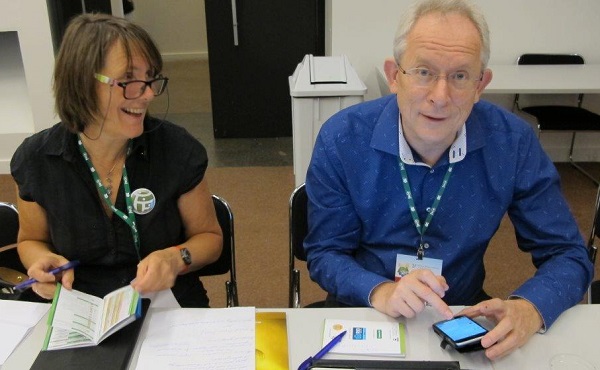SIG Migrant Care new co-chair, Guus Busser

The WONCA
Special Interest Group on Migrant Care, International Health & Travel Medicine has a new co-chair, Guus Busser, who joins existing chair, Maria van den Muijsenbergh. Above Maria and Guus at work at the WONCA World conference in Rio in 2016. The WONCA Editor finds out more about Guus.
Who is Guus Busser, new co-chair of the SIG Migrant Care?
For several years now, I have worked as the right hand of the chair of the WONCA Special Interest Group Migrant Care, Maria van den Muijsenbergh.
Maria and I are both family doctors, with many common interests, especially vulnerable groups in healthcare. We both work at Radboudumc, Nijmegen, in the Netherlands. Maria leads and initiates many research activities and I am mainly involved in teaching.
I combined working in clinical practice and teaching for 28 years, but these last seven years I have focussed only on the teaching. Many of my patients were vulnerable, had a migrant background, less education, less income. They taught me a lot about their lives, and the world - but also about the imperfect nature of our medical care and of medical education.
Improving and adapting our medical care for the most vulnerable groups gradually became my mission in medical education.
So at this moment my focus in teaching is about the organization of care, culture and healthcare, health illiteracy, migration and vulnerable groups.
I co-designed parts of the undergraduate medicine curriculum, as well as the vocational training for Family Physicians. Recently I developed (with Maria) a three month program for medical students about vulnerable groups, and also again this year a two week summer school for international students.
Coordinating is also a part of my work, such as for all clerkships in Family Medicine, the international elective clerkships at our faculty and all international student and teacher exchanges in the field of family medicine.
Being a senior lecturer, I also like to coach our next generation. I am the coach/mentor of several students in basic medical education, and also of 30 residents, who are following an expert curriculum for example, in education skills, leadership or medical topics. And I coach our junior lecturers team.
I strongly believe that we should address the special needs of migrants and other vulnerable group in our education. And doing so we should not only focus on the many problems patients and doctors have to deal with, but also on the many things these patients can give to us doctors, like a new perspective on and significance of our work.